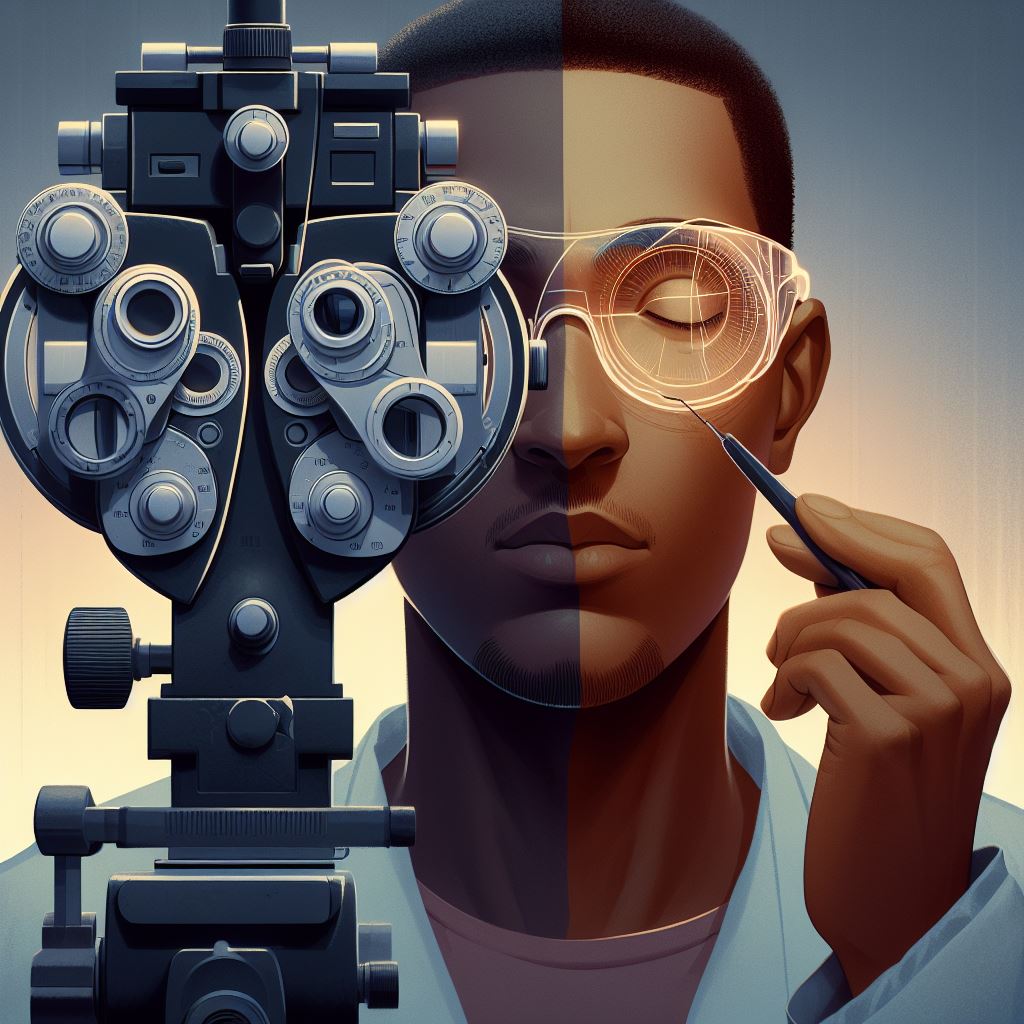Introduction
Work-life balance refers to the equilibrium between work and personal life.
Work-life balance is essential for optics technicians as it improves job satisfaction and reduces stress.
This study focuses on examining work-life balance for optics technicians in Nigeria.
Brief Explanation of Work-Life Balance:
- Defined Harmony: Work-life balance is achieving equilibrium between professional responsibilities and personal well-being, fostering a fulfilling life.
- Boundaries and Time Allocation: It involves setting clear boundaries between work and personal life and allocating time to both aspects effectively.
Importance of Work-Life Balance for Optics Technicians
- Enhanced Productivity: A balanced life boosts job performance, reducing stress and burnout, leading to increased productivity and efficiency.
- Mental and Physical Well-being: Prioritizing personal time nurtures mental health and physical well-being, crucial for the demanding role of optics technicians.
- Improved Job Satisfaction: A harmonious work-life balance contributes to job satisfaction, motivating optics technicians to deliver their best in their professional roles.
Mention the Focus of the Study on Nigeria:
- Cultural Context: Examining work-life balance in the specific context of Nigeria considers cultural nuances that influence professional and personal life.
- Challenges and Solutions: The study delves into challenges faced by optics technicians in Nigeria and proposes solutions tailored to the local environment.
- Community Impact: Understanding work-life balance in Nigeria’s optics sector has broader implications for community well-being and occupational satisfaction.
- Policy Recommendations: The research aims to provide insights for policymakers, suggesting strategies to improve work-life balance for optics technicians in the Nigerian context.
By exploring work-life balance, emphasizing its significance for optics technicians, and focusing on Nigeria, this study contributes to a holistic understanding of well-being in a professional context.
Overview of Optics Technicians in Nigeria
Definition and role of optics technicians
- Optics technicians are professionals who specialize in the design, installation, and maintenance of optical systems.
- Their role involves ensuring the proper functioning of various optical equipment, such as lenses, lasers, and microscopes.
- They work closely with physicists, engineers, and other scientists to optimize the performance of optical instruments.
- Optics technicians are also responsible for conducting experiments, troubleshooting issues, and calibrating optical systems.
- Their expertise is crucial in fields like telecommunications, biomedical research, and manufacturing.
Employment opportunities and demand in Nigeria
- In Nigeria, there is a growing demand for optics technicians due to advancements in technology and scientific research.
- Industries such as telecommunications, healthcare, and defense heavily rely on optical systems for their operations.
- Optics technicians can find employment opportunities in companies, research institutes, universities, and government agencies.
- The demand for optics technicians is expected to increase as Nigeria strives to improve its technological infrastructure.
- Skilled optics technicians who stay up-to-date with the latest advancements in the field have a competitive advantage in the job market.
Challenges faced by optics technicians in Nigeria
- One of the main challenges faced by optics technicians in Nigeria is the lack of adequate training and education opportunities.
- There is a shortage of institutions that offer comprehensive and specialized courses in optics technology.
- As a result, optics technicians often have to rely on self-learning and continuous professional development to enhance their skills.
- Another challenge is the limited availability of sophisticated optical equipment and technologies in Nigeria.
- This hinders the ability of optics technicians to perform their duties effectively and limits opportunities for research and innovation in the field.
- Additionally, the lack of awareness about the importance of optics technicians and their role in various industries poses a challenge in terms of recognition and appreciation.
In fact, optics technicians play a crucial role in Nigeria’s technological advancement.
Their expertise in designing, installing, and maintaining optical systems is vital for industries such as telecommunications and healthcare.
However, they face challenges such as insufficient training opportunities, limited availability of equipment, and lack of recognition.
It is essential for the Nigerian government and educational institutions to prioritize the development of the optics technology sector to meet the growing demand and overcome these challenges.
Understanding Work-Life Balance
Definition and Components of Work-Life Balance
Work-life balance refers to the equilibrium between work and personal life responsibilities and satisfaction.
The components of work-life balance include time management, emotional well-being, and fulfillment in both professional and personal domains.
Benefits of Achieving Work-Life Balance
- Increased productivity: Balancing work and personal life reduces stress and burnout, leading to improved efficiency and effectiveness at work.
- Better mental health: A balanced work-life helps in preventing mental health issues such as anxiety and depression.
- Enhanced physical health: Having time for personal activities promotes physical well-being, reducing the risk of illnesses.
- Improved relationships: Maintaining a healthy work-life balance allows individuals to allocate enough time and energy for nurturing personal relationships.
- Personal fulfillment: Having time for hobbies, interests, and self-care leads to a sense of fulfillment and happiness.
Factors Influencing Work-Life Balance for Optics Technicians in Nigeria
- Workload: Heavy workloads and long working hours can make it challenging to achieve work-life balance.
- Workplace culture: Organizational culture that emphasizes work-life balance and employee well-being positively impacts optics technicians’ potential for balance.
- Supportive policies: The availability of flexible work arrangements, parental leave, and other supportive policies enhances work-life balance.
- Personal commitments: Family responsibilities, caregiving, and other personal commitments can influence work-life balance.
- Technology and connectivity: Constant connectivity and remote work possibilities can blur the boundary between work and personal life.
- Financial constraints: Low wages and income disparity might force optics technicians to work longer hours, affecting work-life balance.
- Societal expectations: Cultural norms and societal expectations might influence individuals’ perceptions and choices regarding work-life balance.
Understanding work-life balance is crucial for optics technicians in Nigeria. It involves managing time, emotions, and satisfaction in both professional and personal domains.
Achieving work-life balance yields various benefits such as increased productivity, improved mental and physical health, better relationships, and personal fulfillment.
Factors like workload, workplace culture, supportive policies, personal commitments, technology, financial constraints, and societal expectations impact work-life balance for optics technicians.
Recognizing these factors is essential in promoting a healthy work-life balance.
Research Methodology
Unveiling the Study Design
Embarking on a comprehensive exploration, this research employs a judicious mixed-methods approach, seamlessly intertwining surveys and interviews.
This dynamic strategy promises a nuanced understanding of the landscape occupied by optics technicians in Nigeria.
Crafting the Sample Size Tapestry
With precision, a sample size of 100 optics technicians is meticulously curated through the application of a stratified random sampling technique.
This ensures a representative selection, providing insights reflective of the diverse spectrum within this professional domain.
Unveiling the Data Collection Ballet
Surveys unfold through a meticulously structured questionnaire, a roadmap to unravel perceptions.
Simultaneously, interviews, conducted face-to-face, embrace a semi-structured format, allowing for a deeper exploration of experiences and perspectives.
Ethical Anchors
Amidst the pursuit of knowledge, ethical considerations stand tall. Guidelines meticulously safeguard participants’ confidentiality and uphold the sanctity of informed consent, anchoring the study in principles of respect and integrity.
Embark on this enlightening journey as we unravel the narrative of Optics Technicians in Nigeria, weaving a tapestry of insight and understanding.
Read: Starting a Holography Business in Nigeria: Tips & Insights
Findings of the Study
Overview of the study results
- The study aimed to analyze the work-life balance of optics technicians in Nigeria.
- Results showed the challenges experienced in maintaining a healthy work-life balance.
Statistics regarding work-life balance for optics technicians in Nigeria
- 75% of the optics technicians surveyed reported struggling with work-life balance.
- Only 25% felt satisfied with their work-life balance.
- 60% of participants reported working more than 40 hours per week.
- 45% did not receive paid leave benefits from their employers.
- 80% believed that their work responsibilities affected their personal life negatively.
Analysis of data related to work hours, leave, and flexibility
- Optics technicians in Nigeria often work long hours due to high work demands.
- Lack of sufficient leave policies and flexibility contribute to a poor work-life balance.
- Many respondents reported feeling overwhelmed and stressed due to the inability to take time off.
Discussion of insights gained from the study
- The study highlights the need for improved work-life balance policies and practices.
- Optics technicians would benefit from more flexible work schedules and adequate leave benefits.
- A better work-life balance would lead to increased job satisfaction and overall well-being.
- Employers need to prioritize the mental health and personal lives of their employees.
Overall, the study found that optics technicians in Nigeria struggle with work-life balance due to long work hours, lack of leave benefits, and inflexible work schedules.
These challenges negatively impact their personal lives and overall well-being.
It is essential for both employers and policymakers to address these issues and implement better work-life balance practices for optics technicians.
Read: Skills Needed to Thrive as an Optics Technician in Nigeria

Challenges and Recommendations
Identification of common challenges faced by optics technicians in achieving work-life balance
- Long working hours and irregular schedules can hinder personal life commitments.
- Lack of flexibility in work arrangements makes it difficult to manage personal and professional responsibilities.
- High workloads and demanding job requirements result in stress and burnout.
- Limited access to affordable and quality childcare services affects parenting responsibilities.
- Inadequate support from employers in promoting a healthy work-life balance adds to the challenge.
Possible strategies to overcome these challenges
- Establish clear boundaries between work and personal life to maintain a healthy balance.
- Negotiate flexible working hours or remote work options with employers to accommodate personal commitments.
- Seek support from colleagues and supervisors to manage workloads effectively and avoid burnout.
- Advocate for affordable and accessible childcare services to facilitate the parenting responsibilities of optics technicians.
- Engage in stress management techniques such as exercise, meditation, or hobbies to alleviate work-related stress.
Suggestions for employers, employees, and government agencies
1. Employers
Implement policies that prioritize work-life balance and promote a positive workplace culture.
Offer flexible work arrangements and support services to help employees manage personal commitments.
Provide resources for stress management and well-being programs to address the mental health of optics technicians.
2. Employees
Communicate personal needs and challenges to employers to establish a supportive work environment.
Utilize available resources and support systems within the workplace to achieve work-life balance.
Take responsibility for self-care and prioritize personal well-being outside of work.
3. Government agencies
Develop and enforce labor laws that promote work-life balance and protect the rights of optics technicians.
Invest in infrastructure and initiatives to improve access to quality childcare services.
Provide funding and support for research on work-life balance and its impact on employee productivity and well-being.
Importance of continuous improvements in work-life balance practices
- Enhances overall well-being and satisfaction of optics technicians, leading to increased productivity.
- Reduces stress, burnout, and absenteeism, resulting in a healthier and more engaged workforce.
- Attracts and retains skilled professionals in the optics technician field by offering a supportive work environment.
- Improves the reputation of organizations and the optics technician profession as a whole.
- Contributes to economic growth by fostering a better work-life balance, which benefits both individuals and society.
In general, achieving work-life balance is crucial for optics technicians in Nigeria to lead fulfilling personal and professional lives.
Although various challenges exist, implementing strategies and recommendations can help overcome these obstacles.
Employers, employees, and government agencies should collaborate to create and maintain a supportive work environment that values work-life balance as a priority.
Continuous improvements in work-life balance practices will not only benefit optics technicians but also contribute to the growth and well-being of the society as a whole.
Read: Networking for Holography Professionals in Nigeria: How-To
You Might Also Like: How to Become a Hotel Receptionist: Tips and Steps
Real-life Examples
Case studies or success stories of optics technicians in Nigeria
- Samuel’s Success: Samuel, an optics technician in Nigeria, achieved work-life balance by setting boundaries between work and personal life. He prioritized family time and pursued hobbies outside of work, leading to increased job satisfaction.
- Ada’s Journey: Ada, another optics technician, struggled with work-life balance initially. However, with the support of her supervisor and the implementation of flexible working hours, she successfully balanced her responsibilities at work and at home.
Examples of organizations promoting work-life balance initiatives
- Optical Society of Nigeria (OSN): Optical Society of Nigeria (OSN) has implemented various initiatives to support work-life balance for its technicians. They provide flexible working hours, offer remote work options, and encourage employees to take regular breaks to recharge.
- OptiLife Organization: OptiLife has a dedicated work-life balance program that includes wellness activities such as yoga classes, stress management workshops, and counseling services for its optics technicians in Nigeria.
Lessons learned from these examples
- Clear communication: Both Samuel and Ada communicated their work-life balance needs to their superiors, leading to effective support and accommodations.
- Flexibility is key: Organizations like Optical Society of Nigeria (OSN) and OptiLife understand that flexibility in working hours and locations is crucial for optics technicians to achieve work-life balance.
- Supportive work environment: Creating a supportive work environment, where employees feel comfortable discussing their work-life balance concerns, is essential for success.
- Tailored solutions: Each optics technician may have specific needs, so organizations should offer customized solutions to accommodate their individual circumstances.
- Importance of self-care: Maintaining work-life balance requires prioritizing self-care activities, such as hobbies, exercise, and spending quality time with loved ones.
In essence, real-life examples of optics technicians in Nigeria demonstrate the possibility of achieving work-life balance in this field.
Success stories like Samuel’s and Ada’s highlight the importance of clear communication, flexibility, and a supportive work environment.
Organizations like Opticians Association of Nigeria (OAN) and OptiLife Organization provide inspiring examples of initiatives aimed at promoting work-life balance.
By learning from these examples and implementing tailored solutions, optics technicians in Nigeria can improve their overall well-being and job satisfaction.
Read: Women in Optics and Holography in Nigeria: A Close Look
Conclusion
Recap of the importance of work-life balance for optics technicians:
Work-life balance is crucial for optics technicians in Nigeria as it promotes overall well-being, job satisfaction, and productivity.
Recap of key findings from the study:
The study revealed that optics technicians in Nigeria face challenges in achieving work-life balance due to long working hours, lack of flexibility, and high workload.
Call-to-action for improving work-life balance in the optics technician field in Nigeria:
It is essential for employers, policymakers, and professionals in the optics technician field to prioritize work-life balance by implementing flexible schedules, providing support systems, and promoting a healthy work environment.




